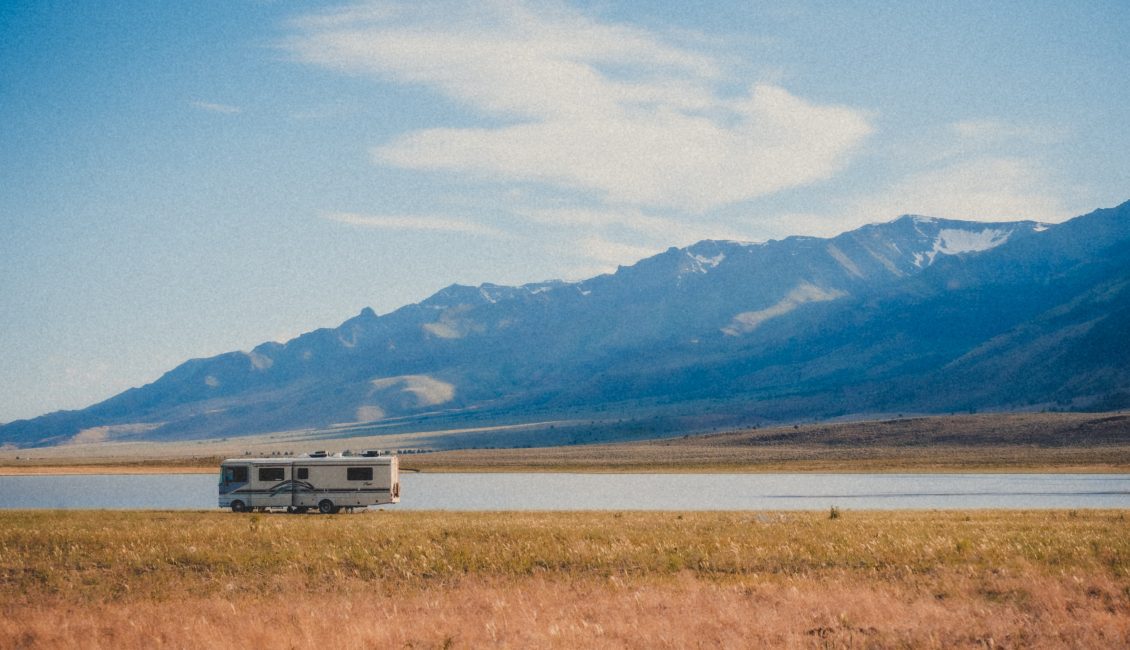
Embarking on a full-time RV lifestyle offers the allure of freedom, flexibility, and the ability to explore the open road on your terms. However, successfully navigating this nomadic life requires careful planning and savvy decision-making.
In this article, we will share the top 10 essential tips for full-time RV living, covering everything from budgeting and downsizing to homeschooling and healthcare on the road.
Whether you're a seasoned nomad or just starting your journey, these tips will help ensure your RV adventure is both fulfilling and stress-free.
RV Budgeting
RV budgeting is a crucial aspect of full-time RV living, requiring careful financial planning and management. When embarking on a nomadic lifestyle, it is essential to establish a budget that accounts for all expenses, including RV meal planning and maintenance.
Planning meals ahead of time can help minimize food waste and ensure that you make the most of your limited kitchen space. By creating a meal plan and shopping list, you can also save money by avoiding impulse purchases.
Additionally, budgeting for RV maintenance is vital to keep your vehicle in top shape. Regular maintenance tasks such as oil changes, tire rotations, and roof inspections should be factored into your budget to prevent costly repairs down the road.
Being proactive with your budgeting will allow you to enjoy the freedom of full-time RV living without the stress of financial uncertainty.
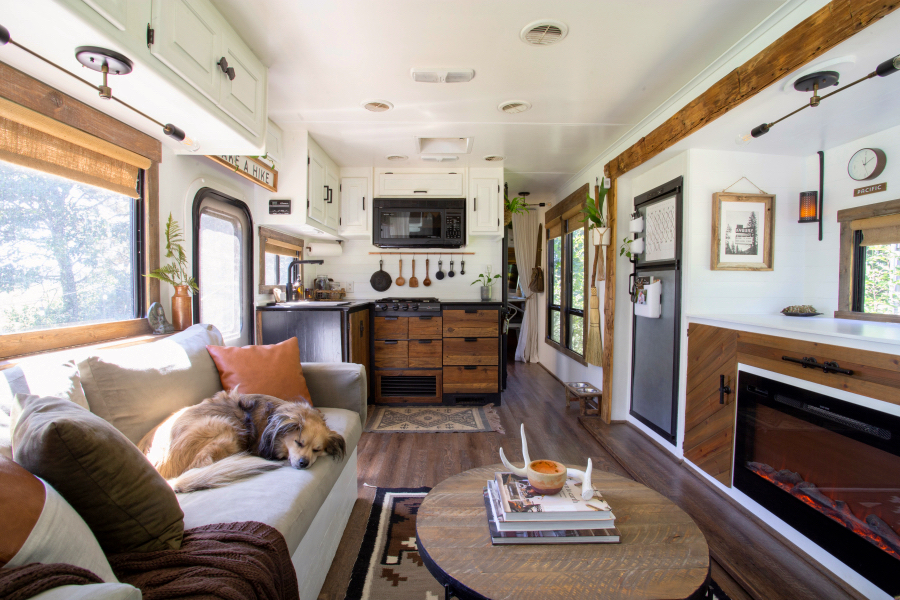
RV Downsizing
When transitioning to a full-time nomadic lifestyle, downsizing becomes an essential task that should be approached with careful consideration and regularity. As you embark on your RV living journey, it's important to optimize your space and make the most of every inch. RV organization and storage are key elements in creating a comfortable and functional living space on the road.
To begin the downsizing process, start by decluttering and getting rid of unnecessary items. Consider what you truly need and what can be left behind. Efficient storage solutions such as collapsible containers, hanging organizers, and under-bed storage bins can help maximize your limited space. Utilize vertical wall space by installing hooks or shelves to store items like kitchen utensils, towels, or small appliances.
RV Homeschooling
When it comes to full-time RV living, one of the challenges that nomadic families face is providing a quality education for their children.
Remote learning can pose its own set of challenges, such as limited internet access and finding suitable learning materials.
However, RV homeschooling also offers unique opportunities for socialization, as children have the chance to meet and interact with other nomadic students on the road.
Remote Learning Challenges
Remote learning while living in an RV presents unique challenges for families on the road. As more families embrace the freedom of full-time RV living, they also need to find ways to ensure their children receive a quality education.
Here are some key challenges families may face when it comes to remote learning in an RV:
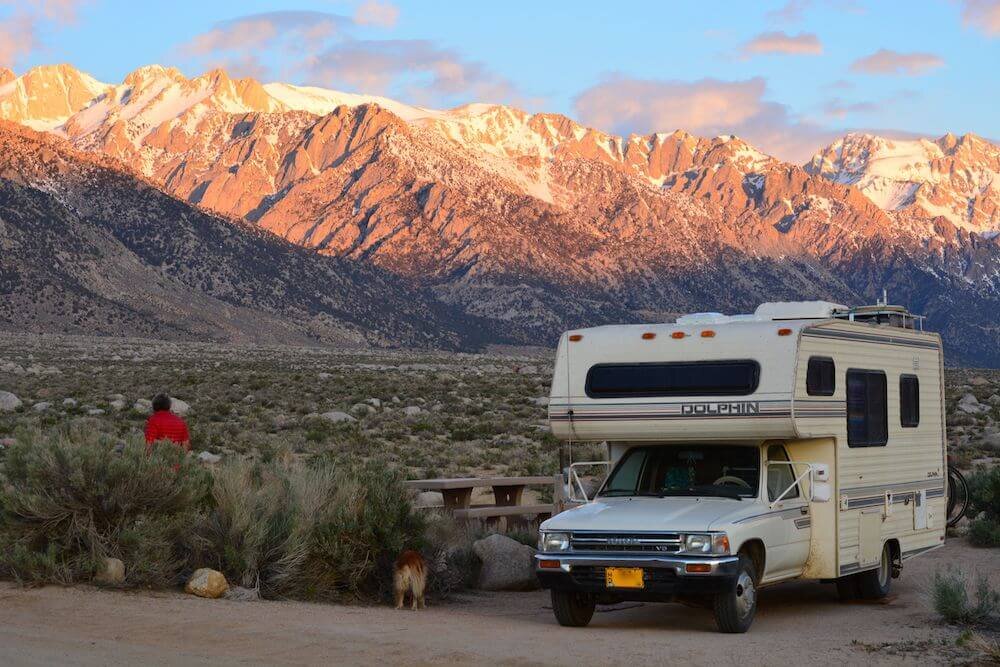
Limited access to reliable internet: Finding a stable internet connection can be a challenge while traveling. However, there are online resources available that offer offline learning options, allowing children to continue their education even without an internet connection.
Balancing travel and learning: Time management becomes crucial when it comes to remote learning in an RV. Families need to strike a balance between exploring new destinations and dedicating enough time to education.
Socialization Opportunities for Nomadic Students
Nomadic students living in RVs have access to unique socialization opportunities through homeschooling. While traditional schooling provides a structured environment for social interaction, RV homeschooling allows students to connect with diverse communities on the road.
Socialization challenges may arise due to the nomadic lifestyle, with limited opportunities for face-to-face interactions with peers. However, nomadic support networks have emerged to address this issue. Families living the RV life often organize meet-ups and gatherings, where students can engage with others who share their unique lifestyle.
Online platforms and social media groups also play a crucial role in connecting nomadic students, allowing them to form friendships and participate in virtual learning communities.
RV Healthcare
When it comes to full-time RV living, healthcare is an important aspect that cannot be overlooked. As nomads, it is crucial to have proper insurance coverage that caters to your specific needs and provides peace of mind.
Additionally, finding healthcare on-the-go can be challenging, but with the right resources and planning, you can ensure access to quality medical care wherever your journey takes you.
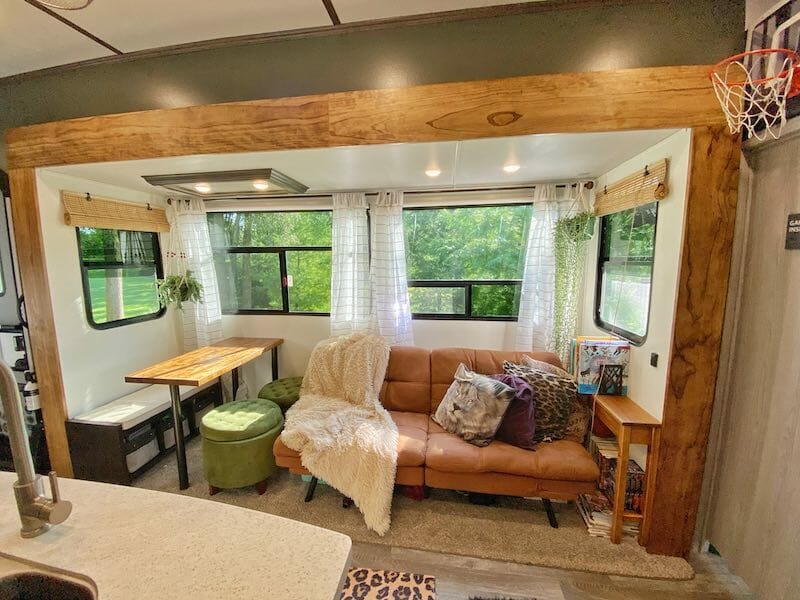
Insurance Coverage for Nomads
Healthcare coverage for nomads living in RVs is an essential aspect of their insurance needs. As nomads, it's important to have health insurance that provides coverage regardless of your location. Here are two key considerations for insurance coverage for nomads:
Health Insurance: Look for a health insurance plan that offers nationwide coverage and includes a network of healthcare providers across the country. This will ensure that you have access to medical care no matter where your travels take you. Consider options that offer telemedicine services, which allow you to consult with doctors remotely, saving you time and money.
Rental Insurance: In addition to health insurance, it's crucial to have rental insurance for your RV. This type of coverage can protect you against theft, damage, and liability while on the road. Look for policies that offer comprehensive coverage, including coverage for personal belongings and emergency expenses.
Having the right insurance coverage will give you peace of mind and allow you to fully enjoy the freedom and adventure of the nomad lifestyle.
Finding Healthcare On-The-Go
As nomads living full-time in an RV, it can be challenging to find reliable healthcare options while on the go. However, with a bit of planning and research, it is possible to ensure you have access to the healthcare you need, no matter where your journey takes you.
One of the first steps in finding healthcare on-the-go is to establish a network of doctors and specialists in the areas you plan to visit. Online directories, such as the American Medical Association's website, can help you find doctors that accept new patients and are located near your current location.
In addition to finding doctors, it is essential to be prepared for emergencies. Researching nearby hospitals and urgent care centers along your route can give you peace of mind knowing that help is available if you need it.
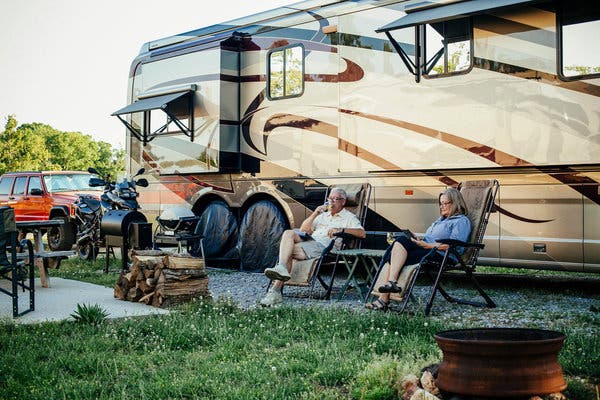
Telemedicine options are also becoming more popular among nomads. These services allow you to consult with a healthcare provider remotely, via video or phone call, eliminating the need for in-person visits for minor illnesses or questions.
Lastly, ensuring you have an adequate supply of prescription medications is crucial. Talk to your doctor about obtaining longer-term prescriptions or using mail-order pharmacies to have your medications delivered to your current location.
RV Work on the Road
Maintaining a steady income while living a nomadic lifestyle requires strategic planning and flexibility in terms of RV work on the road. Thankfully, there are numerous RV job opportunities and remote work options available for those seeking financial stability while enjoying the freedom of the open road.
Here are some key avenues to explore:
Campground Host: Many campgrounds offer free or discounted RV parking in exchange for hosting duties, such as checking in guests and maintaining the grounds.
Freelancing: With the rise of the gig economy, freelancing has become a popular choice for RVers. From writing and graphic design to consulting and virtual assisting, the possibilities are endless.
Online Teaching: If you have a teaching background or expertise in a specific subject, consider becoming an online tutor or instructor.
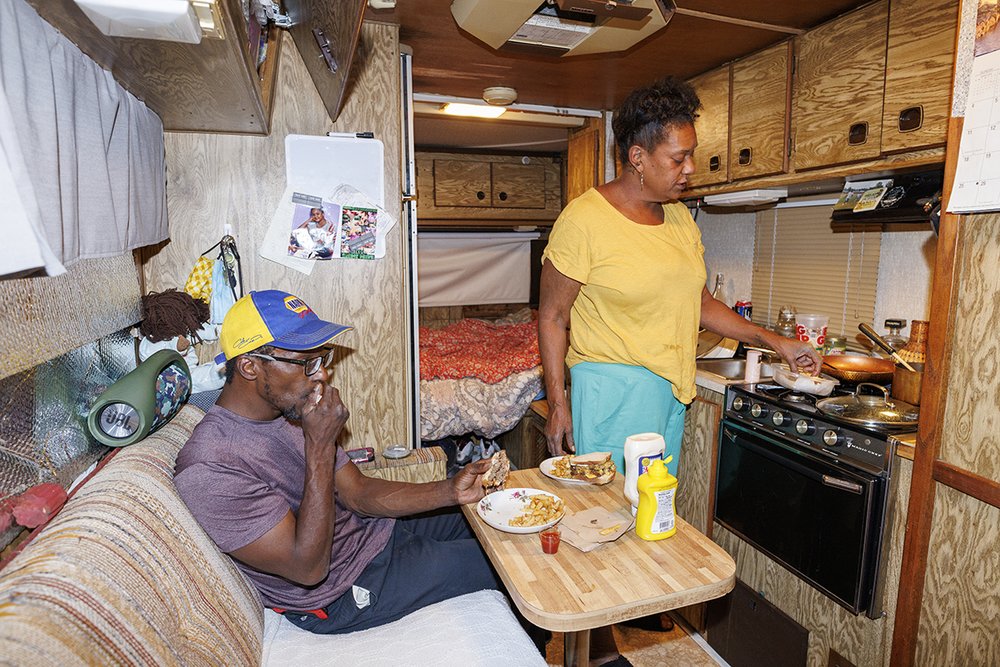
Seasonal Work: Embrace the seasonal nature of RV living by taking on temporary jobs in industries like tourism, hospitality, or agriculture.
One essential aspect of full-time RV living is building connections and networking within the RV community. These connections not only provide a sense of belonging but also open doors to valuable resources and information.
One way to connect with other RVers is by attending RV community events. These events bring together like-minded individuals who share a passion for travel and adventure. They offer opportunities to swap stories, learn from experienced RVers, and make new friends.
Another way to build connections is through RV campground recommendations. When staying at a campground, take the time to chat with fellow campers, exchange recommendations, and learn from their experiences. This can lead to discovering hidden gems and finding the best places to park your RV.
RV Fitness & Wellness
To prioritize physical and mental well-being, it is crucial for full-time RVers to incorporate fitness and wellness routines into their nomadic lifestyle. Staying active and maintaining a healthy lifestyle can be challenging while living on the road, but with some planning and creativity, it's definitely achievable.
Here are some tips to help you stay fit and maintain good mental health while living in your RV:
RV Exercise Routines:
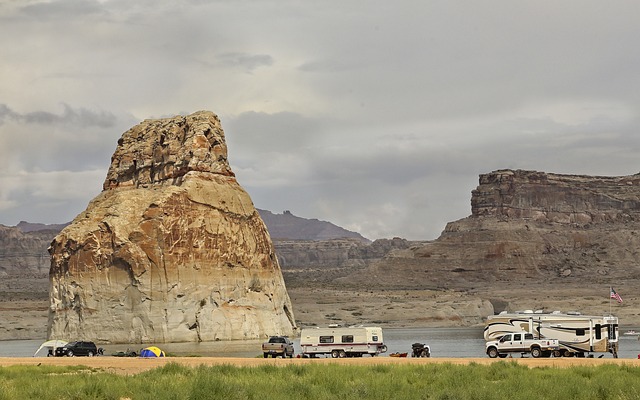
Create a workout schedule that fits your lifestyle and stick to it.
Utilize the space around your RV for outdoor activities like hiking, biking, or yoga.
Mental Health in RV Living:
Practice mindfulness and meditation to reduce stress and promote relaxation.
Connect with nature by spending time outdoors and appreciating the beauty around you.
RV Pet Care
Prioritizing the care and well-being of your furry companions is essential when living a nomadic lifestyle in an RV.
While enjoying the freedom of the open road, it's important to ensure that your pets receive proper grooming and exercise to keep them happy and healthy.
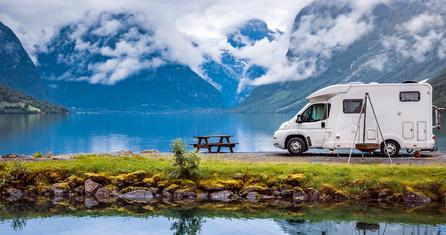
When it comes to RV pet grooming, it's a good idea to invest in a portable pet grooming kit, which includes essentials like brushes, nail clippers, and shampoo. Regular grooming not only keeps your pets looking their best, but it also helps to prevent matting and skin issues.
Additionally, providing your pets with regular exercise is crucial for their overall well-being. Take advantage of the great outdoors by going on hikes, walks, or playing fetch. Keeping your pets active will not only help them stay fit, but it will also provide mental stimulation and reduce any potential behavioral issues.
RV Security
When it comes to RV security, there are three key points to consider: locks and alarms, surveillance cameras, and safety while traveling.
Locks and alarms are essential for protecting your RV from potential break-ins, providing a sense of security whether you're inside or out exploring.
Surveillance cameras offer an extra layer of protection, allowing you to monitor your surroundings even when you're away.
Lastly, ensuring safety while traveling involves being mindful of your surroundings, practicing caution when parking in unfamiliar areas, and staying vigilant during your nomadic adventures.
Locks and Alarms
RV security is a crucial aspect of full-time nomad life. Using strong locks and alarms is essential to ensure the safety of your vehicle and belongings. When it comes to protecting your RV, investing in high-quality door locks is a must. Look for sturdy, tamper-proof locks that are specifically designed for RVs. These locks should be able to withstand attempts of forced entry and provide an added layer of security.
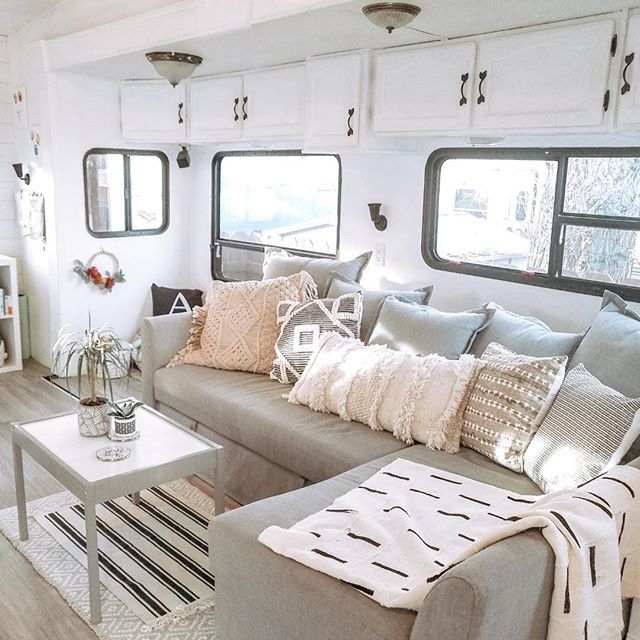
Additionally, consider installing an alarm system to further enhance your RV's security. Modern alarm systems are equipped with motion sensors, door sensors, and even remote access capabilities, allowing you to monitor your RV's security at all times.
With the right combination of RV door locks and alarm systems, you can enjoy the freedom of nomad life while having peace of mind knowing that your vehicle and belongings are secure.
Surveillance Cameras
One essential aspect of full-time nomad life is ensuring the security of your RV and belongings, which can be achieved through the use of surveillance cameras. Installing a surveillance system in your RV provides peace of mind and helps protect against theft and vandalism.
When choosing a surveillance system, consider factors such as image quality, storage capacity, and ease of installation. Look for cameras that offer high definition video and night vision capabilities to capture clear footage even in low light conditions.
It's important to address privacy concerns when installing surveillance cameras, especially if you are traveling with others or staying in public areas. Be mindful of local regulations and ensure that your cameras are not infringing on others' privacy.
Safety While Traveling
Ensuring the safety of your RV while traveling is of utmost importance, and there are several measures you can take to enhance RV security. Here are some essential tips to help you stay safe on the road:
- Install a reliable alarm system: A good alarm system can deter potential thieves and alert you in case of any unauthorized entry.
- Use quality locks: Invest in high-quality locks for your RV doors and windows to prevent break-ins.
- Secure your valuables: Store valuables in hidden compartments or safes to minimize the risk of theft.
- Practice situational awareness: Be mindful of your surroundings and stay vigilant, especially in unfamiliar areas.
- Have emergency contacts: Keep a list of emergency contacts handy, including local authorities and roadside assistance services.
- Stay connected: Maintain a reliable internet connection for remote work and to stay updated on weather and road conditions.
- Be prepared for emergencies: Carry a well-stocked emergency kit that includes first aid supplies, flashlights, and extra batteries.
RV Winter Living
Maintaining warmth and comfort during the winter months is crucial for those living full-time in a recreational vehicle. RV winter activities can be exciting and adventurous, but it's important to be prepared for the challenges that come with colder temperatures.
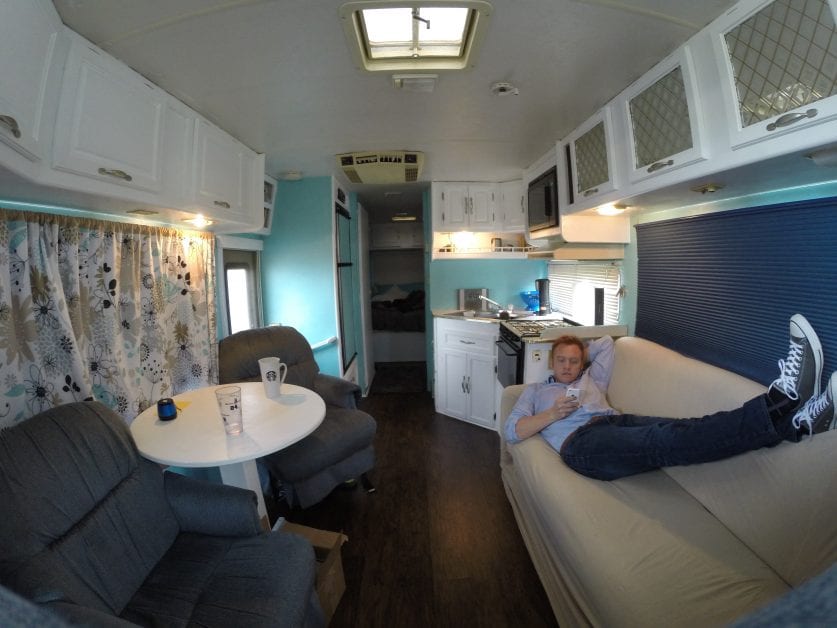
One of the first steps in preparing for winter living is winterizing an RV. This involves insulating the vehicle, sealing any drafts, and ensuring that the heating system is in good working condition.
It's also essential to have proper winter gear, such as heavy blankets, thermal curtains, and warm clothing.
Additionally, it's important to plan for winter activities that can be enjoyed while on the road, such as skiing, snowboarding, or visiting winter festivals.
Frequently Asked Questions
What Are Some Tips for Finding Reliable Healthcare While Living a Nomadic Lifestyle in an Rv?
Finding reliable healthcare while living a nomadic lifestyle in an RV can be challenging. However, by finding affordable insurance options and accessing telemedicine services, nomads can ensure they have access to necessary medical care no matter where they roam.
How Can I Ensure the Safety and Security of My RV and Belongings While on the Road?
Ensuring the safety and security of your RV and belongings while on the road is crucial. Implementing RV security measures and strategies, such as installing alarm systems and using secure storage solutions, can help protect your valuables on your nomadic journey.
Are There Any Specific Considerations or Tips for RVing With Pets?
When traveling with pets, it's important to consider their needs and find pet-friendly campgrounds. RVing with dogs requires exercise and proper containment, while RVing with cats may involve litter box placement and secure hiding spots.
What Are Some Ways to Stay Connected With the RV Community and Meet Fellow Nomads on the Road?
To stay connected with the RV community and meet fellow nomads on the road, consider joining online forums and social media groups dedicated to RV living. Additionally, finding local RV parks and campgrounds, as well as attending RV rallies and events, can provide opportunities for networking and building relationships within the community.
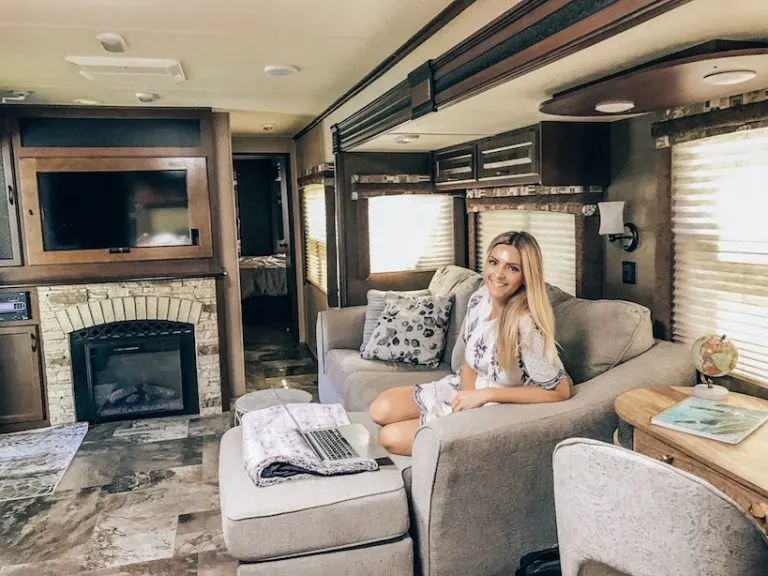
What Are Some Essential Tips for RVing During the Winter Months and Dealing With Cold Weather Conditions?
When RVing during the winter months, it is essential to prioritize RV winterization and staying warm in an RV. Properly insulating your RV, using space heaters, and utilizing heated blankets can help combat the cold weather conditions.
 Liveaboard LifestyleTravel DestinationsExPat Places to LiveRV LifeDigital Nomad TravelPrivacy PolicyTerms And Conditions
Liveaboard LifestyleTravel DestinationsExPat Places to LiveRV LifeDigital Nomad TravelPrivacy PolicyTerms And Conditions
